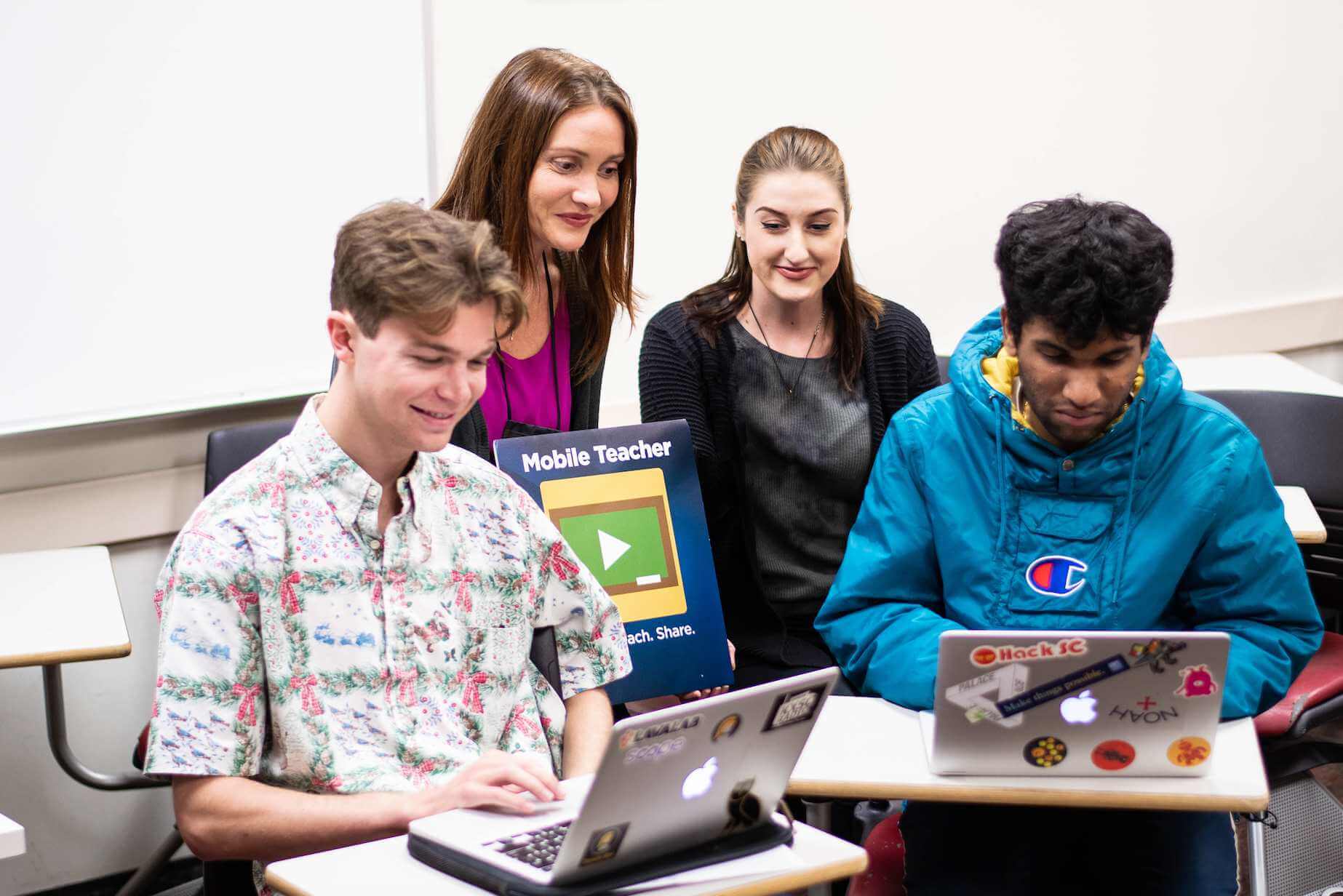
Left to Right: William Durkee, ’19 B.S. computer science, Katherine Guevara, project manager, Veronica Perry, ’19 M.S. communication management from USC Annenberg, and Sachet Vijai, ’19 B.S. computer science during a working session on the Mobile Teacher App. Photo Emily Smith for the Daily Trojan
Although it might seem as if “everyone is online these days,” that’s not truly the case – even in the United States.
More than two million Americans still use AOL’s dial-up Internet connection and millions of public-school students and their teachers living in under-served areas have difficulty accessing the technological resources others take for granted. Zooming out globally, only three billion, less than half of the world’s population, is currently online.
Teachers in rural and remote areas may have fewer or no professional development opportunities and tend to be more isolated from colleagues. What they do have are cell phones, but not necessarily with Internet.
Katherine Guevara, an instructional designer at the USC Center for Excellence in Teaching, believes the digital divide does not have to affect teachers’ access to opportunity for professional development, especially now with the advent of offline design and endeavors created for this market such as Google’s Next Billion Users initiative.
“We wanted to develop a global community of practice for teachers and by teachers who aren’t used to seeing themselves as such.”
Katherine Guevara
Guevara witnessed this inextricable link between education and access to information firsthand during her more than a decade experience researching offline teacher training and working overseas as a U.S. Peace Corps volunteer in Ukraine and English language fellow in Ecuador. After having created an educational television show in Ecuador that reached over a million people, Guevara realized the power of basic technology to scale training and learning and to create a sense of global community.
With the help of computer science students at the USC Viterbi School of Engineering, she developed an Android app called Mobile Teacher built for teachers in developing countries that may have limited or no Internet access. Available for download on Google Play, the app allows teachers around the world to share videos of their effective teaching practices with their peers and learn from each other. The app also works offline allowing viewing and sharing videos without the need for Internet.
“Wouldn’t it be nice to see somebody that looks like you, teaching in a context that is like yours, and recognize that person as an expert?” Guevara said. “This wasn’t happening until now so we wanted to develop a global community of practice for teachers and by teachers who aren’t used to seeing themselves as such.”
Mobile Teacher aims to localize expertise by encouraging teachers to submit content that can cover a wide range of subjects, in any language. All the videos come from teachers working in what Guevara prefers to call the “majority world” though the terms developing world or emerging market remain common. She also created a scorecard of best practices to help developers follow research-based guidelines when designing for people in the majority world.
Byron Li, who graduated this year with a B.S. in computer science from USC Viterbi’s Department of Computer Science, said that working on the app has been thrilling, especially working with Android. The computer science team selected the Mobile Teacher app as their capstone project in Jeffrey Miller’s “Design and Construction of Large Software System” class, which teams students with outside stakeholders to work on real-world projects.
“The course offers students a unique opportunity to test their programing skills and to see their ideas come to life in the real world,” said Miller, director of USC Viterbi’s Information Technology Program. “These aren’t hypothetical exercises. These are real clients with real deliverables and real design challenges for a CS student. What’s exciting to see in the last few years that I’ve been teaching this course is students increasingly interested in projects meant to benefit humanity and not just turning a profit.”
Li agreed: “I think the altruistic approach for computer science is definitely increasing in popularity, and because of that hopefully we will end up seeing more and more use of technology in humanitarian contexts.”
Guevara has been awarded the opportunity to return to Ecuador, her country of assignment as an English Language Fellow Program alumna. She was one of 13 program alumni to be selected as part of the “Fellows@50 Encore: Go Back, Give Back” contest commemorating the 50th Anniversary of the U.S. Department of State’s English Language Fellows Program.
“The Mobile Teacher project stood out not only to our program staff in Washington, D.C., but also to U.S. Embassy staff posted overseas,” said Maggie Steingraeber, outreach manager at the U.S. State Department Bureau of Educational and Cultural Affairs. “In this particular proposal, we saw the potential to empower teachers from underserved communities to use accessible technology to improve their practice and expand their professional network. We also recognized the impact this project had on young, globally-minded engineers, enlisting the help of undergraduate students at USC Viterbi in its development and implementation.”
Guevara will spend two weeks in Ecuador testing the app where she will visit multiple sites to reach the most remote and marginalized teachers. She hopes to continue working with USC Viterbi students to develop the app further and include more features, such as more advanced searching capabilities and language translation features.
Earlier this year, USC Viterbi became a partner institution in the U.S. State Department’s Diplomacy Lab, a public-private partnership that enables the State Department to “course-source” research and innovation related to foreign policy challenges.
Published on June 4th, 2019
Last updated on May 16th, 2024












